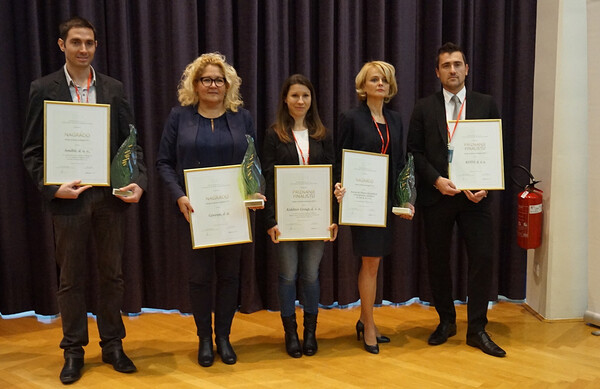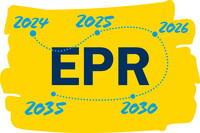Plastic upcycling by Interseroh awarded Slovenian environmental prize

Dr Manica Ulcnik-Krump (2. from right) at the Slovenian environmental prize awards in Ljubljana. ©ALBA Group
Cologne/Ljubljana. Today, the environmental service provider Interseroh was awarded the Slovenian environmental prize for its ground breaking research and development work on the upcycling procedure Recycled-Resource. The renowned award has been presented annually for more than twenty years by the business newspaper Finance and the Slovenian environmental fund Eko sklad. Since 2016, Interseroh, a company of the international recycling specialist ALBA Group, has been operating its own competence centre for recycling plastics in Maribor, Slovenia.
“The competence centre in Maribor has now become a kind of modern think tank for recycling innovations. Here, we continually develop Recycled-Resource and the materials that arise from this, and exactly according to customer requirements“, says Dr Manica Ulcnik-Krump, Head of Business Unit Recycled-Resource at Interseroh. “Our claim is to provide high quality and tailor made plastic regranulates, which are a better, sustainable alternative to primary material. That is why I am delighted about the environmental prize, which is an important official recognition of our work.”
The Recycled-Resource production process – which has won several awards – is based on a sophisticated upcycling recompounding process: Automated high-tech sorting of various types of waste is followed by grinding, cleaning and washing plastics, according to pre-defined quality parameters, the extrusion and restabilisation as well as chemical modification with additives, to obtain the exact characteristics that the customer requires.
In this process, the two plastic recyclates Procyclen and Recythen occur, whose use is proven to have a positive effect on the environment, in comparison to new granulate: According to a study by the Fraunhofer Institute UMSICHT, Procyclen and Recythen provide a valuable contribution to the sustainable use of resources and reduce the emissions of greenhouse gases during manufacturing by 30 to 50 per cent.



![[Translate to English - Englisch:] [Translate to English - Englisch:]](/fileadmin/_processed_/1/4/csm_230606-AGA-Tridi-Indonesia-PET-recycling_e3dcd2ad90.jpg)